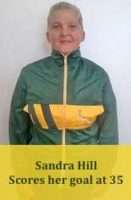There are certain sports that are considered to be suitable for women – and for a very long time soccer wasn’t one of them! However, from a young age Sandra Hill had the extraordinary goal of playing women’s soccer – for South Africa. And she succeeded.
“We’d sit around as kids and talk about our dreams. I wanted to be the first coloured woman to reach for the stars and be a South African woman soccer player.”
Sandra, who is now sixty-two, can proudly say she is a former Springbok soccer player. She’s from Steenberg, Cape Town.
How did it all begin? In the time-honoured tradition: “We played soccer in the streets and we were privileged because that’s where soccer started.”
Young Sandra knew what her goal was and kept her focus – taking her eyes off the ball was definitely not in her game plan. She says she watched her peers throw their lives away but she just couldn’t drop the ball.
“When everybody else used to go party I had to go sleep because I’d have a tournament the next day.”
She’s concerned about how today’s youth are easily influenced to make wrong choices: “You can stop now and say ‘no’ to something bad. If you turn away from drugs don’t worry about anyone who’s going to criticize you. My mother gave me a gift and talent and it’s what I do with it that mattered. I could either go party or play soccer.”
It has not been an easy road to success. At some points in life she felt like she was the soccer ball herself, because life was kicking her around. “We grew up without a father and my mom had to raise seven children on her own,” she recalls. However, “My mother laid a foundation for us and what we did with it is what mattered. My family’s support carried me through and God’s help made me stronger. I had to go work at sixteen years because my older siblings got married. I didn’t have soccer boots and I had to use someone else’s. Everything I had was paid off my pockets.”
Although playing constantly, Sandra reached thirty-five years without realising her dream, and apartheid inequality didn’t make circumstances any easier for her.
“We were coloureds and that meant we had to work harder to make the team.” She adds that some individuals also wanted to take advantage of their financial situation. “The privileged ones would offer to buy you drinks so they may jump into bed with you.”
Call her a late bloomer but at last Sandra finally netted her childhood goal.
“In 1988 I was chosen to play for South Africa in Italy. I had to raise my funds and my family helped me get that R2500. It was a lot of money that time,” she says. “I played with women that were my sons’ ages [16 and 19 years old] but it wasn’t about the age. It was about fitness. I told one player that, ‘I’m ten years older but ten years better than you!’” she laughs. Sandra has two grown ups sons.
Family support was essential at this time: Sandra’s mom was not well, but she still looked after her grandchildren when Sandra went to Italy.
Unfortunately, a career-ender injury forced her to hang up her boots after this highlight. “Just after we returned from Italy I got an injury. The doctor said I should pack up – no more soccer for me. I was on crutches for six weeks,” Sandra says.
“Nobody [in soccer administration] cared about me after that; they never came to check how I was. Then in 1994 they asked me to play for provincial but I turned them down. I’ll not deprive a youngster an opportunity. I said, ‘Don’t worry about me, take someone else,’” she affirms.
Sandra’s love of soccer still shines: she now coaches in her community in a bid to keep children off the streets. Her career may have ended but her contribution continues to be treasured.
Life has had its ups and downs, but Sandra received a major boost in older age: she couldn’t contain her happiness about acquiring a home. “I finally got my own house after thirty-five years! If God’s with you, nobody can be against you.”
What advice does Sandra have for young people – especially girls – wanting to compete? She emphasises that people must have faith in themselves: “Anybody who has a dream, they must go for it. People must believe in themselves because people will disrespect you if you don’t. We’re constantly trying to please everybody except ourselves. We put ourselves last and that has to end,” she maintains.
Sandra is one of twelve women featured in the book Being A Woman In Cape Town: Telling Your Story published by Face2Face Books, an imprint of Cover2Cover Books. You can order a copy by sending an email to info@womanzonect.co.za
***
Tell us: What lesson did you take away from this inspiring article?







